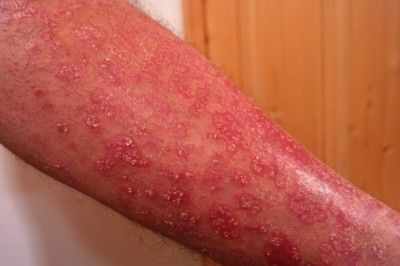Psoriasis: symptoms and treatment options
Psoriasis, as psoriasis is called in professional circles, is a widespread disease. In Germany, about 2.5% of the population suffers from the skin disease. Approximately 125 million people worldwide are affected.
Causes and triggers of the chronic inflammatory skin disease are not yet fully understood, but it is certain that the predisposition is inherited and provoked by internal and external factors.
In addition to the skin, the disease can also affect the nails and internal organs. Psoriasis is not contagious.
Symptoms of psoriasis
Psoriasis is usually manifested by itchy rashes on the skin. These are raised, roundish, dry and red. Depending on the affected region of the body, the skin may also peel.
Thick, white shiny scales form. Usually the scalp, elbows, knees and skin folds are particularly affected. The rash can form but almost all regions of the body.
Different intensities of the rash can be observed in affected individuals. A few small areas can be affected, but psoriasis can also occur over a large area in many places at the same time.
Periodic recurrences can be observed in patients. After periods of rest, the symptoms can worsen again significantly. Without medical treatment, the disease rarely subsides on its own.
Causes of psoriasis
The causes of the disease are not yet fully understood. It is considered certain that the autoimmune disease is hereditary. Only the predisposition is inherited, and therefore it is not given that one gets psoriasis in spite of the disease of the parents.
Psoriasis develops because the body produces new skin cells too quickly, to which the skin reacts with symptoms of inflammation. Stress, alcohol, smoking and other infectious diseases can trigger or intensify the inflammations.
Diagnosis of psoriasis
The symptoms of psoriasis are quite clear. Usually a quick look by the doctor is enough to diagnose psoriasis. For medical treatment, it is important to determine the severity of the autoimmune disease.
For this purpose, the attending physician often examines a skin cell under the microscope. If the joints are painful and there is a fear that they are affected by the lichen, a blood test and X-rays are useful.
Treatment of psoriasis
It is not yet possible to cure psoriasis causally. However, there are many treatment options that take away most of the pain for patients. In order to slow down the progression of the disease, it is crucial to start therapy at an early stage.
In most cases, ointment is applied or tablets are taken. But also light therapies are supposed to help. Since psoriasis can become a major psychological burden for some patients, cognitive behavioral therapy is useful in these cases.
Those who suffer from psoriasis should by no means lose the courage to face life. While this can be a great mental and physical strain, you should remain positive.
People should talk openly about their disease and make it clear to others that it is not contagious. In addition, there are more and more creams, bath additives and shampoos that can bring relief.
